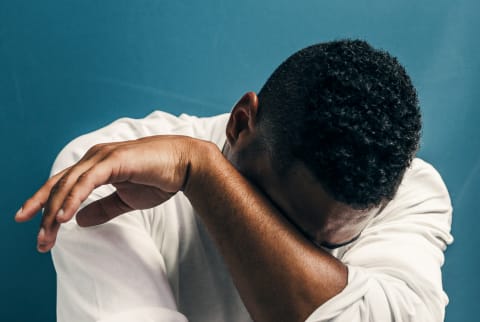Advertisement
New Data Reveals 1 In 4 Young People Have Contemplated Suicide During COVID


When cases of COVID-19 began to spike, the number of people experiencing loneliness and isolation spiked, too—among other emotional, financial, and health-related anxieties. New data from the Centers for Disease Control and Prevention (CDC)1 shows just how striking this mental health crisis is becoming.
The report looked at survey responses from 5,412 adults regarding their mental and behavioral health at the end of June. More than 10% of the respondents said they seriously considered suicide in the past 30 days (compared to 4.3% in 2018). The percentages were much higher for young adults, Black and Hispanic respondents, essential workers, and unpaid caregivers. This is the percentage of people who contemplated suicide in each category:
- Unpaid caregivers for adults: 30.7%
- Young adults (18 to 24): 25%
- Essential workers: 21.7%
- Hispanic respondents: 18.6%
- Black respondents: 15.1%
Along with suicidal thoughts, 13.3% of respondents used substances, like alcohol or drugs, to cope; 26.3% experienced trauma and stressor-related disorders (TSRD); and 30.9% suffered from depression or anxiety disorders.
According to the report, this drastic decline in adults' mental health is associated with the mortality rates of the virus, as well as physical distancing and stay-at-home orders.
The link between COVID-19 and mental health.
The mental toll has been immense—even before you consider one in four young people have contemplated suicide—and with these statistics, it's even more clear the situation is dire.
"Before COVID, we were in the middle of a loneliness epidemic, with about half of Americans reporting feeling lonely," psychiatrist Nina Vasan, M.D., MBA, previously told mbg. When the pandemic hit, people who weren't previously affected by loneliness suddenly were.
"Social distancing has made it harder for most people to prioritize their social and health needs because many of the past activities or habits they enjoyed are now not possible," Vasan says.
Loneliness2 can affect physical pain, risk of disease, depression, and suicidal thoughts. In fact, since the pandemic started, prescriptions for new antidepressant medications increased by 19%, according to one report. Along with loneliness, anxiety surrounding the uncertainty of the virus, job and economic insecurity, the loss of loved ones, and more caused researchers to predict a looming psychiatric epidemic3.
Neuropsychiatrist Daniel Amen, M.D., calls these two crises the "pandemic squared" and urges people to proactively tend to their mental health in order to prevent a continued or growing emergency. "It is more important now than ever before to put health—social, mental, and physical—at the top of your list," Vasan says.
If you're experiencing prolonged feelings of depression or other symptoms of mental illness, please consider reaching out to a medical professional for help. If you or someone you love is experiencing suicidal thoughts, please contact the National Suicide Prevention Lifeline at 1-800-273-8255.